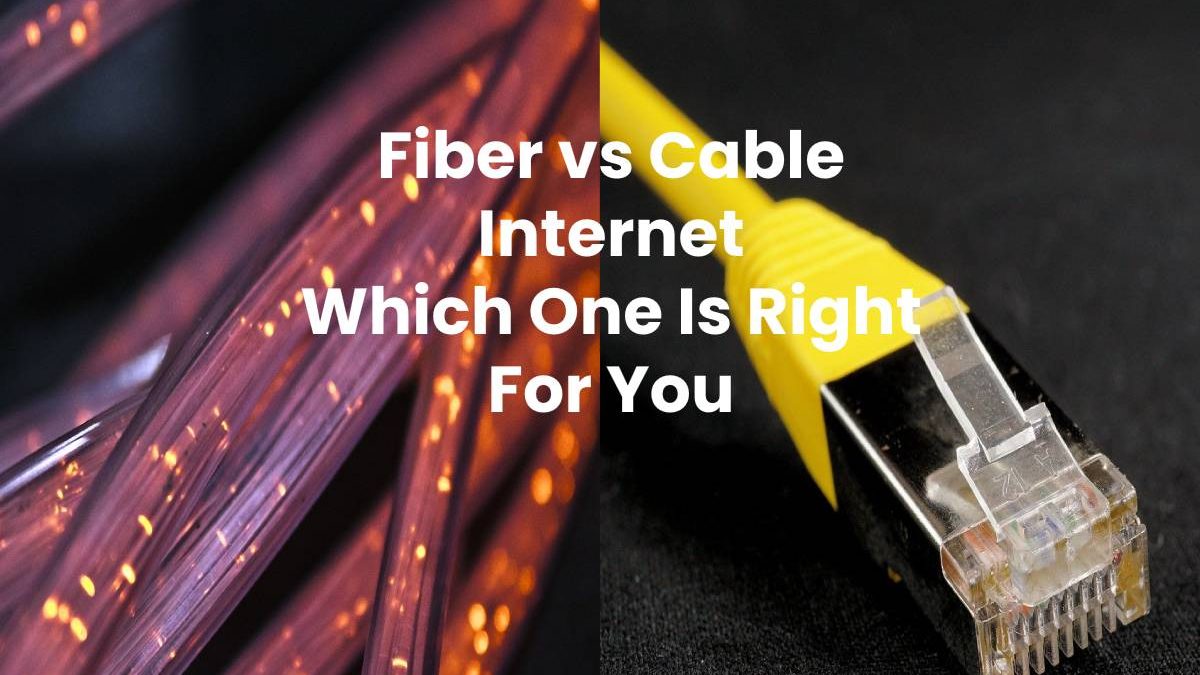Out of a global population of 7.7 billion people, 4.8 billion are active internet users as of July 2020. In the digital age, the internet is more of a necessity than a luxury. Without it, life wouldn’t be as simple or as exciting as it is.
When it comes to broadband internet connectivity, you have more than a few options to choose from. You can settle for DSL, satellite, cable modem, or fiber connection. The problem most people have nowadays is choosing between fiber vs cable internet.
In this post, we’ll be looking at fiber and cable internet to find out which of the two is the better option. Starting off with how the two work, and what are the pros and cons of both. That way, you can make a more informed decision the next time you need internet service.
Table of Contents
What Is Cable Internet?
Cable internet is exactly what it sounds like; it’s an internet service technology that utilizes cables to connect users to the internet. With cable internet, data is transmitted via copper coaxial cables and transmitted using electricity. It’s an age-old technology, and the same one we use to watch cable TV.
Cable internet is one of the most widespread forms of internet connectivity today. That’s because it utilizes the already existing infrastructure earlier built for TV service. So any region with cable TV can also get cable internet without much of a hassle.
What Is Fiber Optic Internet?
When it comes to internet connectivity, most people consider fiber-optic connections more advanced than the other alternatives. That’s because fiber internet doesn’t use metal wires or electricity to transmit data from one point to another. Instead, it uses strands of glass to transmit light signals that carry data to and from.
It’s the latest entry to the internet service market and comes in two types. Direct Internet Acess fiber, or DIA fiber, which is used for mission-critical operations by large organizations or government agencies. DIA fiber employs a static IP with a dedicated line to the premises and doesn’t experience interruptions.
The second type of fiber internet is broadband fiber, which is widely available to the public. Unlike DIA fiber, with broadband fiber, you don’t get a dedicated line, meaning your IP also changes from time to time. It’s prone to the occasional interruptions but is fairly stable.
Fiber vs Cable Internet: The Lowdown
Choosing between fiber optic internet vs cable is one of the toughest decisions most internet and tech enthusiasts have to deal with. If you’re looking for internet service, here’s what you should consider before making your pick.
Fiber Internet Speed vs Cable Speed
One major consideration when getting internet service is internet speed. Between fiber and cable internet, which one is faster? We’re glad you asked; let’s examine the speeds of both in detail.
Fiber optic internet is unequivocally faster with speeds of up to 10 Gbps. Not to say that cabled internet is dead slow; it’s just that fiber internet is way faster. Plus, the cable internet speeds will suffice for small and medium business needs and ordinary residential use.
However, your internet speed largely depends on the internet service provider you settle for. To get high speed internet, you need to do your homework and find a reputable internet service provider.
With a usual cabled connection, you can get speeds from 10 Mbps to 1 Gbps. These speeds are enough for your business, streaming movies, and playing online games.
Availability
When it comes to availability, cable internet has the upper hand. As mentioned earlier, cable internet uses the already existing TV service infrastructure. Plus, it’s an older technology when compared to fiber optic internet, hence more widespread.
Fiber optic internet is available in most urban markets, like cities, towns, and commercial areas. Furthermore, most internet service providers are eager to expand their fiber internet networks. If fiber internet isn’t currently available in your area, it should be in a few months or years.
If fiber internet doesn’t cover your area, it might be a bit expensive to get it to your premises. However, for large businesses, investing in fiber internet is worth it.
Price
Generally, you should expect to pay more for fiber optic internet than for cable internet. However, with so many entries into the fiber internet industry, the price gap is gradually shrinking.
If you have multiple branches for your business, or own a residential complex, then fiber optic is a viable option. That’s because you get unmatched speed for all the locations, which makes it worth the price.
Reliability
When it comes to reliability, then fiber internet is, hands down, the better option. You’re more likely to have a stable and more higher quality connection with fiber internet.
Cable internet means you share your line with plenty of other homes and businesses. That makes it very unreliable because it’s prone to downtime and the occasional speed dips. If you can’t afford any internet downtime, then you’re better off with fiber internet.
How to Choose Between Fiber Internet and Connect
As for which is better of the two, the choice boils down to your unique situation. While some people swear by fiber internet, it might not be a viable option from most folks. Make your decision; make sure you weigh out all the factors before opting for either.
Choose What’s Best for You
When it comes to fiber vs cable internet, the better option depends on what you need from your ISP. Fiber internet may not be available in some areas, but cable internet will do just fine. Also, make sure you explore all options before settling on any internet service.
Besides the ISP and technology, there are tons of other factors you need to consider to get the most of your internet. To find out about these factors and all matters technology, be sure to check out the other pieces on the site.

